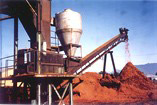 Like most industries, a successful sawmill utilizes the best possible equipment, and is run by the most knowledgeable and skilled employees. Accomplishing this is no simple task, however. There are generally phases to design and build a sawmill and each one requires a level of professional knowledge.
Like most industries, a successful sawmill utilizes the best possible equipment, and is run by the most knowledgeable and skilled employees. Accomplishing this is no simple task, however. There are generally phases to design and build a sawmill and each one requires a level of professional knowledge.
Knowing the Business
Because sawmills process wood and related materials, there is a certain amount of uncertainty involved in their business; the growth and availability of materials can vary and mill owners much be prepared for this. A mill must be designed to manage sudden overflow of incoming wood and outgoing product, but not put so much into the mill that it’s overstuffed and a large percentage goes unused during slow production periods. An outline and model for the mill should include some flexibility to meet fluctuating market needs and product availability.
Optimum Equipment
The absolute best and most expensive equipment is a nice benefit, but it’s not necessary. What’s better is the right equipment for the job—to calculate as closely as possible what machinery is absolutely necessary. This element of the design is directly related to the issue of market and production fluctuation; the machinery should be able to handle times of high demand, but not be a waste when production is slow.
Safe Layout
Of course, safety is paramount. A sawmill is a collection of potential dangers and safety regulation for employees isn’t enough to prevent incidents. The safety precautions must begin at the mill’s conception. Aisles must have room to move, but additional space may be helpful to aid in preventing incidents. Equipment should be positioned carefully to accommodate the product and the people operating the machines.
Even a professional needs some help to build a sawmill; conception, design, and construction are all complex processes that are best done as a collaboration. At BEP Engineering Services, we work with you to make your ideas come to life.




